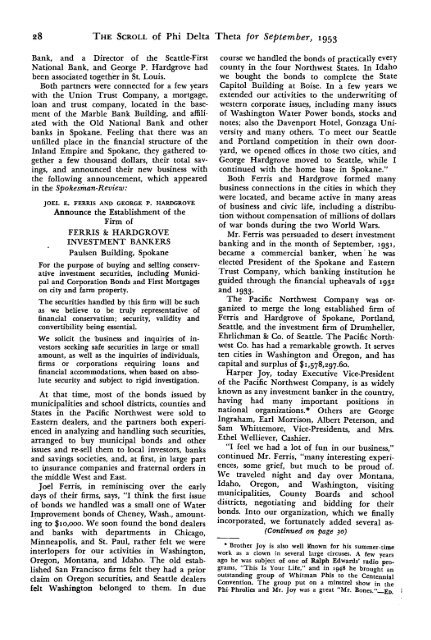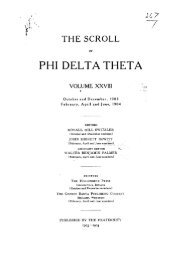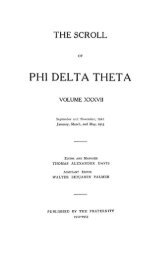1953–54 Volume 78 No 1–5 - Phi Delta Theta Scroll Archive
1953–54 Volume 78 No 1–5 - Phi Delta Theta Scroll Archive
1953–54 Volume 78 No 1–5 - Phi Delta Theta Scroll Archive
Create successful ePaper yourself
Turn your PDF publications into a flip-book with our unique Google optimized e-Paper software.
28 THE SCROLL of <strong>Phi</strong> <strong>Delta</strong> <strong>Theta</strong> for September, 1953<br />
Bank, and a Director of the Seattle-First<br />
National Bank, and George P. Hardgrove had<br />
been associated together in St. Louis.<br />
Both partners were connected for a few years<br />
with the Union Trust Company, a mortgage,<br />
loan and trust company, located in the basement<br />
of the Marble Bank Building, and affiliated<br />
with the Old National Bank and other<br />
banks in Spokane. Feeling that there was an<br />
unfilled place in the financial structure of the<br />
Inland Empire and Spokane, they gathered together<br />
a few thousand dollars, their total savings,<br />
and announced their new business with<br />
the following announcement, which appeared<br />
in the Spokesman-Review:<br />
JOEL E. FERRIS AND GEORGE P. HARDGROVE<br />
Announce the Establishment of the<br />
Firm of<br />
FERRIS & HARDGROVE<br />
INVESTMENT BANKERS<br />
Paulsen Building, Spokane<br />
For the purpose of buying and selling conservative<br />
investment securities, including Municipal<br />
and Corporation Bonds and First Mortgages<br />
on city and farm property.<br />
The securities handled by this firm will be such<br />
as we believe to be truly representative of<br />
financial conservatism; security, validity and<br />
convertibility being essential.<br />
We solicit the business and inquiries of investors<br />
seeking safe securities in large or small<br />
amount, as well as the inquiries of individuals,<br />
firms or corporations requiring loans and<br />
financial accommodations, when based on absolute<br />
security and subject to rigid investigation.<br />
At that time, most of the bonds issued by<br />
municipalities and school districts, counties and<br />
States in the Pacific <strong>No</strong>rthwest were sold to<br />
Eastern dealers, and the partners both experienced<br />
in analyzing and handling such securities,<br />
arranged to buy municipal bonds and other<br />
issues and re-sell them to local investors, banks<br />
and savings societies, and, at first, in large part<br />
to insurance companies and fraternal orders in<br />
the middle West and East.<br />
Joel Ferris, in reminiscing over the early<br />
days of their firms, says, "I think the first issue<br />
of bonds we handled was a small one of Water<br />
Improvement bonds of Cheney, Wash., amounting<br />
to 110,000. We soon found the bond dealers<br />
and banks with departments in Chicago,<br />
Minneapolis, and St. Paul, rather felt we were<br />
interlopers for our activities in Washington,<br />
Oregon, Montana, and Idaho. The old established<br />
San Francisco firms felt they had a prior<br />
claim on Oregon securities, and Seattle dealers<br />
felt Washington belonged to them. In due<br />
course we handled the bonds of practically every<br />
county in the four <strong>No</strong>rthwest States. In Idaho<br />
we bought the bonds to complete the State<br />
Capitol Building at Boise. In a few years we<br />
extended our activities to the underwriting of<br />
western corporate issues, including many issues<br />
of Washington Water Power bonds, stocks and<br />
notes; also the Davenport Hotel, Gonzaga University<br />
and many others. To meet our Seattle<br />
and Portland competition in their own dooryard,<br />
we opened offices in those two cities, and<br />
George Hardgrove moved to Seattle, while I<br />
continued with the home base in Spokane."<br />
Both Ferris and Hardgrove formed many<br />
business connections in the cities in which they<br />
were located, and became active in many areas<br />
of business and civic life, including a distribution<br />
without compensation of millions of dollars<br />
of war bonds during the two World Wars.<br />
Mr. Ferris was persuaded to desert investment<br />
banking and in the month of September, 1931,<br />
became a commercial banker, when he was<br />
elected President of the Spokane and Eastern<br />
Trust Company, which banking institution he<br />
guided through the financial upheavals of 1932<br />
and 1933.<br />
The Pacific <strong>No</strong>rthwest Company was organized<br />
to merge the long established firm of<br />
Ferris and Hardgrove of Spokane, Portland,<br />
Seattle, and the investment firm of Drumheller,<br />
Ehrlichman & Co. of Seattle. The Pacific <strong>No</strong>rthwest<br />
Co. has had a remarkable growth. It serves<br />
ten cities in Washington and Oregon, and has<br />
capital and surplus of 11,5<strong>78</strong>,297.60.<br />
Harper Joy, today Executive Vice-President<br />
of the Pacific <strong>No</strong>rthwest Company, is as widely<br />
known as any investment banker in the country,<br />
having had many important positions in<br />
national organizations.* Others are George<br />
Ingraham, Earl Morrison, Albert Peterson, and<br />
Sam Whittemore, Vice-Presidents, and Mrs.<br />
Ethel Welliever, Cashier.<br />
"I feel we had a lot of fun in our business,"<br />
continued Mr. Ferris, "many interesting experiences,<br />
some grief, but much to be proud of.<br />
We traveled night and day over Montana,<br />
Idaho, Oregon, and Washington, visiting<br />
municipalities. County Boards and school<br />
districts, negotiating and bidding for their<br />
bonds. Into our organization, which we finally<br />
incorporated, we fortunately added several as-<br />
(Continued on page jo)<br />
* Brother Joy is also well l&iown for his summer-time<br />
work as a clown in several large circuses. A few years<br />
ago he was subject of one of Ralph Edwards' radio programs,<br />
"This Is Your Life," and in 1948 he brought an<br />
outstanding group of Whitman <strong>Phi</strong>s to the Centennial<br />
Convention. The group put on a minstrel show in the<br />
<strong>Phi</strong>- Phrolics and Mr. Joy was a great "Mr. Bones." ED.

















